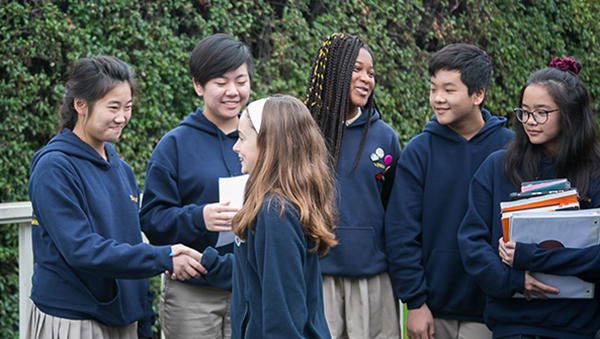Crafting Student Leaders – Part 3 of 5: Social Leadership
This week, in the Morning Assembly—the daily meeting where Clairbourn students, staff, and parents gather to hear an inspiring message—the topic was the school’s new mission statement “Creating Scholars and Leaders with Heart.” The student presenters delivered the following message about the importance of student leadership prepared by foreign language and drama teacher Cara Barker. The Insights below are based on the work of DiSC and the work of psychologists David Merrill and Roger Reid, who in their book Personal Styles & Effective Performance identified four social styles: Analyticals, Drivers, Expressives and Amiables.
Today we look at how the Social leader behaves. Social leaders befriend the members of a group and get to know them on a personal level. In showing genuine interest, they put people at ease and place a high priority on wellness and harmony within that group.
Social leaders communicate gently, usually asking more questions than providing answers. Social leaders are highly accommodating and are especially important to groups composed of varying personality types and whose members, without a safe or appropriate space in which to work, would be left either isolated, divided or feeling unappreciated.

Social leadership involves including, accommodating, and listening to others in a group.
READ MORE
Part 1: Leadership Styles | Part 2: Driver Leadership | Part 3: Social Leadership | Part 4: Conscientious Leadership | Part 5: Enthusiast Leadership
Back
Valuing cooperation, a Social leader might hold dear Jesus’ Golden Rule, “In everything, do to others what you would have them do to you.”
Social leaders often put their skills to use in people-pleasing jobs, such as guidance counselors or human resource managers. They must take care not to reject criticism outright, mistaking it for negativity, nor to avoid risk-taking, fearing that a particular outcome might upset the group. Since Social leaders value feelings over facts, it is especially important for them to prioritize goals in ways that include task completion.
If you find yourself identifying as a Social leader, then you can practice your prioritization skills, choosing which activities need to be completed in which order. If you do so, then you will be exercising the type of leadership embodied in the Conscientious leader, which we will explore further tomorrow.
In closing, consider the words of poet and author Maya Angelou, recipient of the Presidential Medal of Freedom, “I’ve learned that people will forget what you’ve said, people will forget what you’ve done, but people will never forget how you have made them feel.”
Watch student presenters share a Chapel message at the daily Morning Assembly encouraging students to express social leadership as based on the school’s mission statement “Creating Scholars and Leaders with Heart.”
Part 1: Leadership Styles | Part 2: Driver Leadership | Part 3: Social Leadership | Part 4: Conscientious Leadership | Part 5: Enthusiast Leadership
Private School Education for Preschool, Kindergarten, Elementary School, & Middle School Grades - Serving Families in the Pasadena Area and Surrounding Cities












